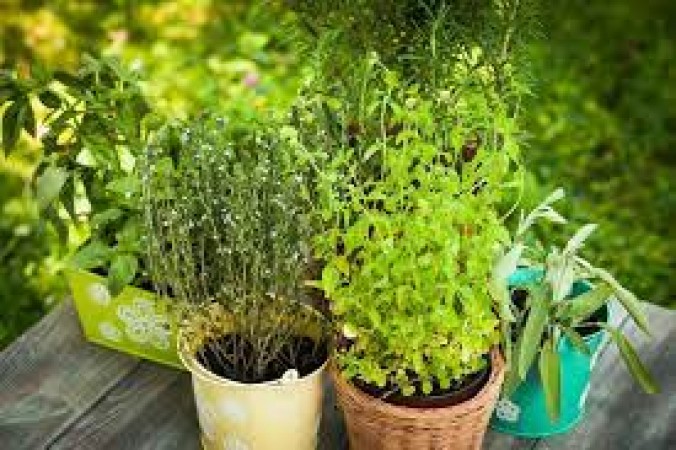
In today's fast-paced world, where stress and pollution have become the norm, the importance of maintaining good health cannot be overstated. While modern medicine offers solutions to many ailments, there's a growing trend towards incorporating natural remedies into daily life. One way to embrace this holistic approach is by planting herbal plants at home. Not only does this provide easy access to natural remedies, but it also offers a range of other benefits for your health and well-being.
1. Creating a Sustainable Home Garden
Setting up a herbal garden at home is not only beneficial for your health but also contributes to sustainability. By growing your own herbs, you reduce reliance on store-bought produce, which often involves long-distance transportation and excessive packaging. Additionally, cultivating herbs at home promotes biodiversity and supports local ecosystems.
2. Easy Access to Fresh Herbs
Imagine stepping into your backyard or kitchen garden to pluck fresh herbs for your meals or remedies. Having a variety of herbs readily available means you can incorporate them into your cooking, teas, or homemade skincare products whenever you need them. This not only enhances the flavor of your dishes but also ensures maximum potency and freshness of the herbs.
3. Cost-Effective Alternative to Store-Bought Remedies
Herbal remedies can be expensive when purchased from stores, especially if they are organic or sustainably sourced. By growing your own herbal plants, you can significantly cut down on expenses associated with purchasing packaged herbs or herbal supplements. With minimal investment in seeds or starter plants, you can enjoy a continuous supply of fresh herbs at a fraction of the cost.
4. Promoting Mental Well-Being
Gardening, in general, has been shown to have numerous mental health benefits, including reducing stress and anxiety levels. The act of nurturing plants and watching them grow can be incredibly therapeutic. In particular, the soothing aroma of many herbs, such as lavender or chamomile, can help calm the mind and promote relaxation, making your home environment more tranquil and conducive to overall well-being.
5. Enhancing Air Quality
Many herbal plants possess air-purifying properties, which can help improve indoor air quality. For example, plants like aloe vera, basil, and mint are known for their ability to absorb toxins and release oxygen, creating a healthier indoor environment. By incorporating these plants into your home decor, you can breathe easier and reduce the risk of indoor air pollution.
6. Encouraging Sustainable Living Practices
Growing herbal plants at home aligns with sustainable living practices by reducing your carbon footprint and promoting self-sufficiency. By cultivating your own herbs, you minimize the need for transportation, packaging, and energy-intensive agricultural practices associated with commercial herb production. Additionally, you have control over the use of pesticides and chemicals, ensuring that your herbs are grown in an environmentally friendly manner.
7. Educational Opportunities for the Family
Creating a herbal garden at home provides valuable educational opportunities for both children and adults. It offers hands-on learning experiences about plant growth cycles, herbal remedies, and the importance of biodiversity. Involving the whole family in gardening activities fosters a deeper connection with nature and promotes environmental stewardship from a young age.
8. Supporting Pollinators and Beneficial Insects
Herbal plants attract a variety of pollinators, such as bees, butterflies, and birds, which play a crucial role in maintaining ecosystem health. By planting herbs like lavender, thyme, and sage, you provide food and habitat for these beneficial insects, contributing to the conservation of biodiversity in your local area. Supporting pollinators also enhances the productivity of your garden by ensuring proper pollination of flowering plants.
9. Cultivating a Sense of Pride and Accomplishment
Watching your herbal garden thrive and flourish can be incredibly rewarding. Whether you're a seasoned gardener or a novice enthusiast, successfully growing herbs at home instills a sense of pride and accomplishment. Harvesting your own herbs and using them in culinary or medicinal preparations creates a deeper connection to the natural world and fosters a sense of self-sufficiency.
10. Strengthening Community Connections
Sharing surplus herbs with neighbors, friends, or local community organizations is a wonderful way to strengthen community connections and promote healthy living practices. It fosters a sense of generosity and cooperation, as well as encourages others to embrace sustainable gardening practices. Community herb exchanges or workshops provide opportunities for knowledge sharing and social interaction, further enriching the gardening experience.
In conclusion, planting herbal plants at home offers a multitude of benefits for both your health and the environment. From promoting sustainable living practices to enhancing mental well-being and supporting local biodiversity, cultivating a herbal garden is a rewarding endeavor with far-reaching positive impacts. So why not roll up your sleeves, get your hands dirty, and start growing your own herbal oasis today?
Poultry Farming: If you are rearing poultry then pay special attention to these things
Tech Giants Unite Against AI-Generated Election Meddling
ISRO's YUVIKA Program 2024: Enrollment Opens for Class 9 Students; How to Sign Up and More Details